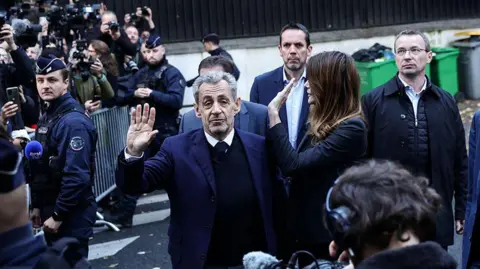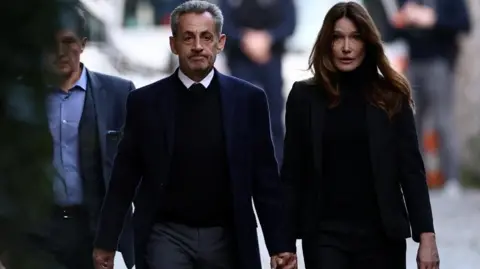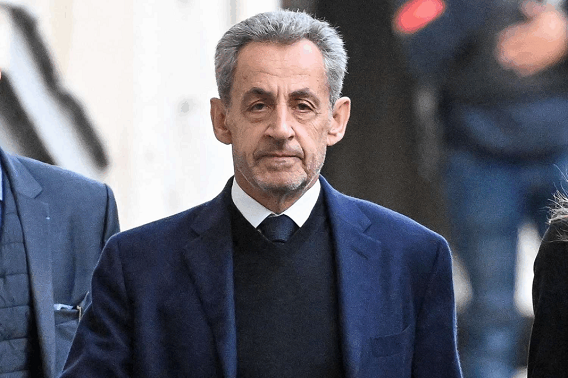Nicolas Sarkozy has become the first French ex-president to go to jail, as he starts a five-year sentence for conspiring to fund his election campaign with money from late Libyan dictator Muammar Gaddafi.
Not since World War Two Nazi collaborationist leader Philippe Pétain was jailed for treason in 1945 has any French ex-leader gone behind bars.
Sarkozy, who was president from 2007-2012, has appealed against his jail term at La Santé prison, where he will occupy a small cell in the its isolation wing.
More than 100 people applauded and shouted “Nicolas!” as he left his villa in the exclusive 16th district of Paris, holding his wife Carla Bruni-Sarkozy by the hand.
His son Louis, 28, had appealed to supporters for a show of support, while another son, Pierre, called for a message of love – “nothing else, please”.
Nicolas Sarkozy, 70, was driven through the entrance of the notoriously overcrowded 19th-Century prison in the Montparnasse district south of the River Seine at 09:40 local time (07:40 GMT), while dozens of police officers cordoned off most of the surrounding streets.
He continues to protest his innocence in the highly controversial Libyan money affair and posted a message on X as he was driven to the jail, saying: “I have no doubt. Truth will prevail. But how crushing the price will have been.”
“With unwavering strength I tell [the French people] it is not a former president they are locking up this morning – it is an innocent man,” he wrote. “Do not feel sorry for me because my wife and my children are by my side… but this morning I feel deep sorrow for a France humiliated by a will for revenge.”
Moments after Sarkozy entered jail, his lawyer Christophe Ingrain said a request for his release had been filed. Nothing justified his imprisonment, said Mr Ingrain, adding: “He’ll be inside for at least three weeks or a month.”
Sarkozy has said he wants no special treatment at La Santé prison, although he has been put in its isolation section for his own safety as other inmates are infamous drugs dealers or have been convicted for terror offences.

Small cell with TV, and one hour’s daily exercise
Sarkozy’s cell in the prison’s isolation wing is believed to be on the top floor and will measure between 9-11 sq m (95-120 sq ft). There had earlier been talk of him serving his term in the another wing for “vulnerable people”, where other VIPs have been jailed in the past.
He will have a toilet, a shower, a desk, a small electric hob and a small TV, for which he will have to pay a monthly €14 (£12) fee, and the right to a small fridge.
The former president has the right to receive information from the outside world and family visits as well as written and phone contact.
But he is in effect in solitary confinement, allowed just one hour a day for exercise, by himself in the wing’s segregated courtyard.
“Conditions of detention in an isolation wing are pretty hard,” La Santé ex-deputy head Flavie Rault told BFMTV. “You are alone, all the time. The only contact you have is with prison staff. You never come across another detainee for security reasons and there’s a type of social isolation which makes life difficult”.
At the end of last week, Sarkozy was received at the Élysée Palace by President Emmanuel Macron, who told reporters on Monday “it was normal that on a human level I should receive one of my predecessors in that context”.
Macron stressed on Tuesday that it was not his role “to comment on or criticise judicial decisions”, but he said it was normal that for many in France the sight of “a president jailed by this judicial decision would provoke comment”.
In a further measure of official support for the ex-president, Justice Minister Gérald Darmanin said he would go to visit him in prison as part of his role in ensuring Sarkozy’s safety and the proper functioning of the jail.
“I cannot be insensitive to a man’s distress,” he added.

Ever since he left office in 2012, Sarkozy has been dogged by criminal inquiries and for months had to wear an electronic tag around his ankle after a conviction last December for trying to bribe a magistrate for confidential information about a separate case.
Late next month, France’s highest administrative court will give its verdict on Sarkozy’s appeal against a six-month jail term in another illegal campaign financing case known as the Bygmalion affair.
Ahead of his arrival at La Santé prison, Sarkozy gave a series of media interviews, telling La Tribune: “I’m not afraid of prison. I’ll keep my head held high, including at the prison gates.”
Sarkozy has always denied doing anything wrong in a case involving allegations that his 2007 presidential campaign was funded by millions of euros in Libyan cash.
The former centre-right leader was cleared of personally receiving the money but convicted of criminal association with two close aides, Brice Hortefeux and Claude Guéant, for their role in secret campaign financing from the Libyans.
The two men both had talks with Gadaffi’s intelligence chief and brother-in-law in 2005, a meeting arranged by a Franco-Lebanese intermediary called Ziad Tiakeddine, who died in Lebanon shortly before Sarkozy’s conviction.
As he lodged an appeal, Sarkozy is still considered innocent but he has been told he must go to jail in view of the “exceptional seriousness of the facts”.
Sarkozy said he would take two books with him into prison, a life of Jesus by Jean-Christian Petitfils and the Count of Monte Cristo, Alexandre Dumas’s classic story of a man wrongly imprisoned who escapes to wreak vengeance on his prosecutors.
BBC





